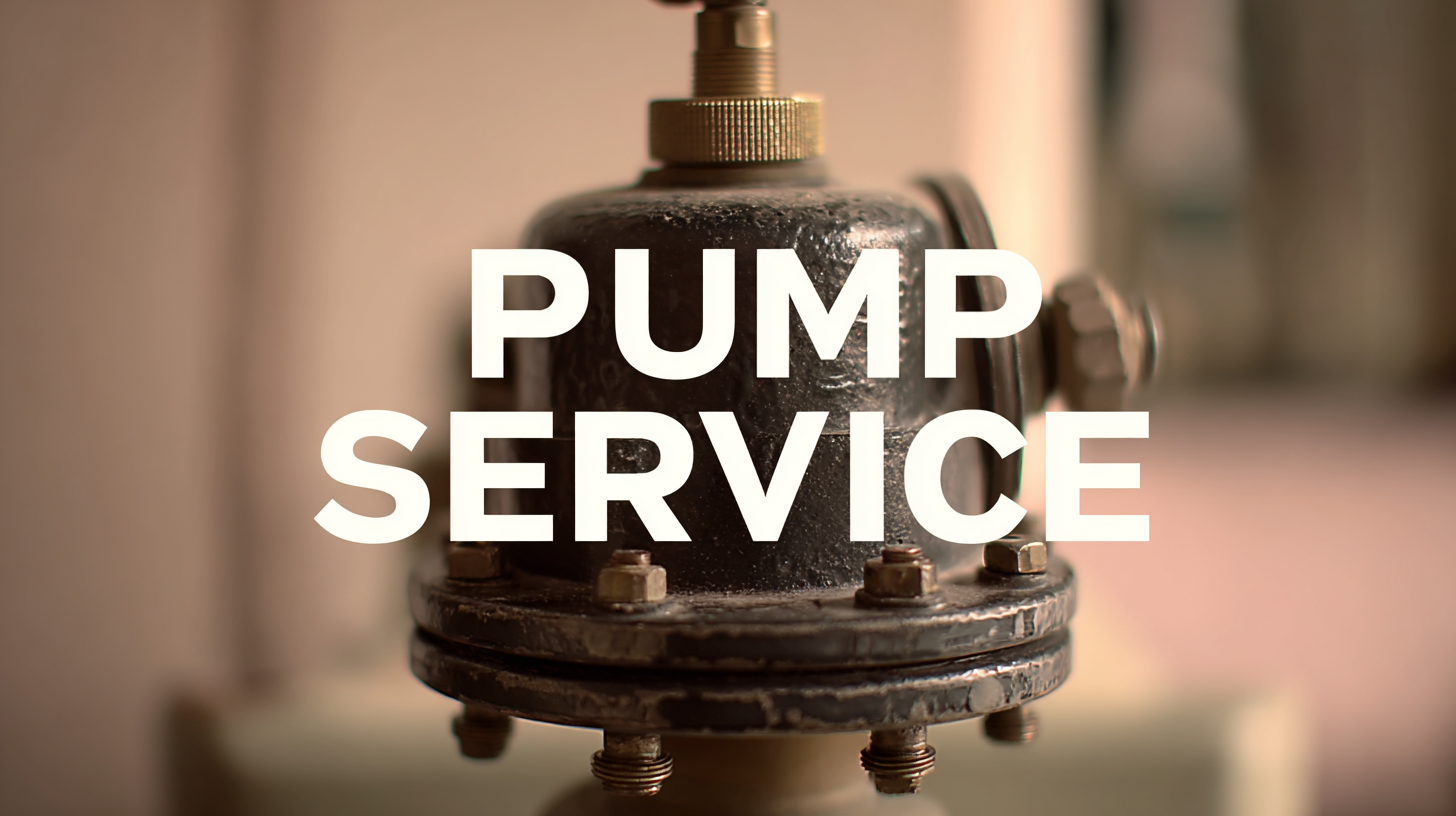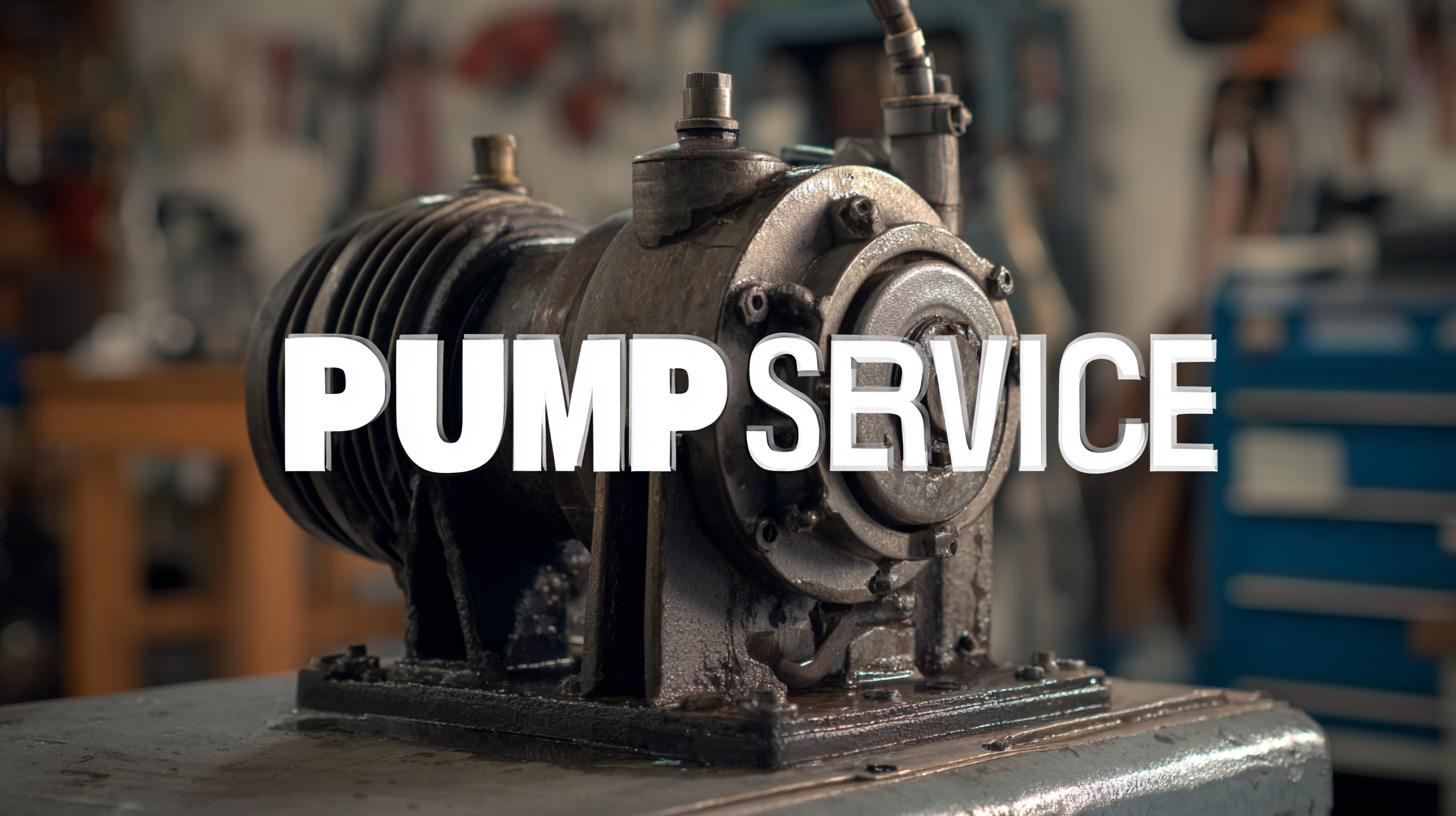- Our Products
- Repairs & Service
- Custom Design
- Blog
- About Us
- Resources
- Industries
- Contact Us
- Contact Bestrei UK
- Compliments / Complaints
- Global Supply
In today's competitive industrial landscape, selecting the right Pump Service is crucial for optimizing operational efficiency and minimizing downtime. According to a recent report by the Global Pump Market Research Institute, the global pump market is projected to reach $75 billion by 2027, driven by the increasing demand for efficient fluid management solutions across various sectors. As businesses invest in advanced pumping technologies, choosing a service provider that understands the intricacies of these systems becomes paramount. Effective pump servicing not only enhances the longevity and performance of pumping equipment but also ensures compliance with industry standards and can significantly reduce maintenance costs. This blog delves into the seven essential factors to consider when selecting the best Pump Service, enabling businesses to make informed decisions that can lead to operational excellence.

When evaluating pump efficiency, understanding key metrics is essential for any business looking to optimize its operations. One of the primary metrics to consider is the pump's hydraulic efficiency, which measures how well the pump converts input power to hydraulic energy. This factor not only affects energy consumption but also impacts operational costs over time. Additionally, monitoring volumetric efficiency—how well the pump minimizes leakage—ensures that your systems maintain optimal performance and reliability.
Another important industry standard to consider is the Net Positive Suction Head (NPSH), which indicates a pump's capability to avoid cavitation. Cavitation can lead to significant damage and reduced lifespan of the equipment if not managed properly. Continuous assessment of these efficiency metrics allows businesses to select and maintain pumps that align with their operational goals, ultimately enhancing productivity and reducing unplanned downtime.
Investing time in evaluating these industry standards is crucial for making informed decisions that can lead to substantial cost savings and improved service life for your equipment.
When it comes to selecting a pump service that effectively meets your business needs, understanding your specific pumping requirements is crucial. Different applications—from agricultural irrigation to industrial fluid transfer—demand unique solutions tailored to their operational challenges. Before committing to a service provider, evaluate the specific characteristics of your pumps, such as flow rate, pressure requirements, and fluid type. This detailed insight will enable you to identify a service that specializes in your field, ensuring you receive the most effective support.
Custom solutions play a significant role in optimizing pump performance across diverse applications. A reputable pump service should offer a range of options to accommodate varying conditions, such as temperature, viscosity, and environment. Engaging with a service provider that conducts a thorough assessment of your system allows for bespoke solutions that enhance efficiency, prolong equipment lifespan, and reduce downtime. By prioritizing your unique needs, you can collaborate with experts to implement tailored strategies that not only meet immediate demands but also anticipate future requirements for sustained success.
This bar chart illustrates the importance of various factors to consider when selecting a pump service for specific business needs. Each factor is ranked based on feedback from industry professionals regarding their significance in diverse pumping applications.
 When selecting a pump service for your business, the service response time is a critical factor that often determines the overall efficiency and reliability of your operations. In industries where downtime translates directly to lost revenue, understanding industry benchmarks for response times can give you an edge when negotiating service contracts. Aim for providers who can guarantee quick turnaround times and have a proven track record for emergency responses.
When selecting a pump service for your business, the service response time is a critical factor that often determines the overall efficiency and reliability of your operations. In industries where downtime translates directly to lost revenue, understanding industry benchmarks for response times can give you an edge when negotiating service contracts. Aim for providers who can guarantee quick turnaround times and have a proven track record for emergency responses.
When evaluating potential pump service providers, consider their historical response times during peak and non-peak hours. A company that can consistently meet or exceed benchmark response times is likely more prepared to handle urgent issues, reducing the risks associated with equipment failure.
Here are a few tips to streamline your selection process:
- Request Performance Metrics: Ask for past performance data on response times to assess reliability.
- Check References: Reach out to current customers to understand their experiences regarding service responsiveness.
- Evaluate Communication: Ensure that the provider has clear communication protocols in place, allowing for quick resolution and updates during service events.
When selecting a pump service provider, safety and compliance are paramount to ensuring that your operations align with industry regulations. According to the Environmental Protection Agency (EPA), over 60% of industrial accidents stem from equipment failure — a risk that can be substantially mitigated by choosing a pump service that prioritizes regulatory compliance. Certified providers are equipped to meet standards set forth by the Occupational Safety and Health Administration (OSHA) and other governing bodies, thus ensuring that your operations not only function efficiently but also operate within legal safety frameworks.
Moreover, the adherence to compliance protocols can significantly affect your bottom line. A recent report by the National Safety Council indicated that companies with robust safety programs can save up to 40% in costs related to accidents and machinery malfunctions. Selecting a pump service that rigorously follows industry standards mitigates risks associated with non-compliance, such as fines or legal repercussions, while fostering a safer working environment. Ensure that potential providers can demonstrate their commitment to safety through certifications and a proven track record of compliance with local and federal regulations.
| Factor | Description | Importance Level |
|---|---|---|
| Safety Standards | Ensure that the pump service provider adheres to local and international safety regulations for equipment. | High |
| Compliance Certification | Check if the company has the necessary certifications from relevant authorities. | High |
| Experience in Industry | Look for providers with a proven track record in your specific industry. | Medium |
| Quality of Equipment | Assess if the pumps and parts used meet quality and efficiency standards. | High |
| Technical Support | Evaluate the availability and quality of technical support the provider offers. | Medium |
| Emergency Response | Check how quickly the provider can react in case of emergencies or breakdowns. | High |
| Cost of Service | Compare costs of service while ensuring that safety and compliance are not compromised. | Medium |
When it comes to selecting a pump service, conducting a cost-effectiveness analysis is crucial. A recent industry report by the MarketsandMarkets Research indicates that the global pump market is projected to grow from USD 68.4 billion in 2023 to USD 92.3 billion by 2028, with a compound annual growth rate (CAGR) of 6.4%. This growth underscores the importance of investing in reliable pump services that not only meet immediate operational needs but also deliver long-term value.
Balancing upfront investments with potential long-term benefits involves examining various factors such as maintenance costs, service reliability, and equipment longevity. According to a 2022 study published by the Hydraulic Institute, businesses that prioritize investing in high-quality pump services can reduce their operational costs by up to 30% over five years, thanks to lower failure rates and reduced maintenance needs. By understanding the financial implications of pump service choices, companies can more effectively allocate resources and ensure sustainable operations that support future growth.

Bestrei UK has a strong footprint across Europe
United Kingdom, Ireland, France, Germany, Norway, Finland Sweden, Spain, Italy